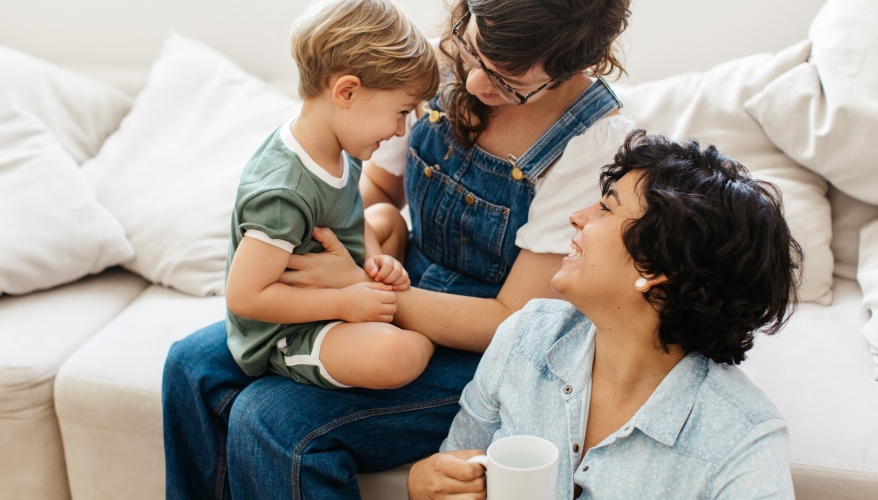The good news is that children can and do learn how to become kind, responsible, and socially acceptable without using punitive measures, by using these respectful alternatives shown below:
1. Look behind ‘bad’ behaviour and assume positive intent
We are encouraged by many ‘parenting experts’ to either ignore or punish bad behaviour, but this means we may miss out on an opportunity to listen to what our child is trying to communicate to us. If we see a tantrum or ‘bad behaviour’ as ‘naughtiness’, then ignoring or punishing our child will make sense. If we see it as a loud emotion that our child is trying to communicate to us the only way they know how, then ignoring or punishing doesn’t make any sense at all. All it does is encourage our child to stop trying to communicate their needs to us because we aren’t listening. Also, what constitutes ‘bad’ or ‘good’ behaviour is very subjective. Looking deeper at the behaviour often makes us understand it more. Behaviour that appears ‘naughty’ or ‘destructive’, most often through a child’s eyes is just innocent exploration and a quest for further knowledge. Sometimes it is just their way of communicating an unmet need.
That can be hard to grasp having been conditioned into believing children are naturally manipulative, sneaky, lazy and greedy. However, if we see our children through a more positive lens, where we trust that they are doing the best they can, we find it easier to accept that our child is still learning and figuring out their way in the world.
2. Imagine the world from our child’s point of view
We often forget how it feels to be a child, thereby judging their actions and words through an adult lens. If we see the world from our child’s point of view it will help us understand their actions and remind us of who our child truly is, by understanding what they face in this world. It is also important to remember that they aren’t us – they have their own interests, views, desires, and personality that we need to honour.
Imagine how you appear and sound from your child’s point of view. Are you empathetic? Are you on their side? Are you respectful to them? Do you validate their feelings? Do you take them seriously? Are you someone who adds to their joy or hinders it? Are you a controller out to ruin their fun or are you someone who enriches their life? Do you really consider their feelings and viewpoints on family issues? Being mindful of who our child is and where s/he is ‘right now’ in the world will help us to parent more gently.
3. Identify and respond to needs
Children don’t always communicate with words, it is often with actions. If they are getting fidgety, grumpy, or displaying ‘bad behaviour’ it may be that they need to get outside, or jump around. They may need quiet time or time alone or a hot bath. They may be feeling sad or upset about something and need to talk. They may need more of you – so get down on the floor and play with them, take them outside for a ball game, or share a book and a snuggle together. Often ‘naughty’ behaviour is just a child’s way of expressing an unmet need so if you remain fully connected and present with your child you should be able to identify way in advance when they are ‘out of sorts’ and respond accordingly.
4. Give information and reasons and find acceptable alternatives
If you child requests something that isn’t agreeable to you (for non-arbitrary reasons) then rather than providing an outright no – try and ‘find the yes’ and offer acceptable alternatives to both of you. For example, if your child wants to colour on walls, then an alternative to reprimand is to explain that this would damage the house and *you* like it nice, explore why they want to colour on the walls, then suggest an acceptable alternative. We may find out that they like standing up to draw or they like drawing big pictures and paper is too small. They may then be just as happy to do chalk drawings in the yard, draw on the garage wall, on the fence, or in the kitchen on a large piece of butcher’s paper. Showing them you are always on their side, trying to find ways for them to get to do what they want, will strengthen their trust in you and set you up as partners rather than adversaries.
5. Model how you want them to behave
We need to treat our children with the same respect, courtesy and kindness we would an adult, and behave in the way we would like them to. How often have you seen parents demand manners from their child that they don’t use themselves? How often have you heard parents behave in ways they would reprimand their child for? Children are always learning, most of which they do from observation. Progressive parenting means allowing them to develop these skills in their own time and in their own way; modelling the behaviour that we would like to see in our children.
6. ‘No’ is an acceptable answer
If ‘no’ is an acceptable answer for adults, then why not for children? Making ‘no’ an acceptable answer for our children shows them how much we respect them. Conventional parenting tells us it is rude and disrespectful for a child to say ‘no’ to a request from a parent, or any adult for that matter. However, isn’t it more disrespectful of adults to not accept a ‘no’ just because they are a child? The more we accept ‘no’ as an acceptable answer, the more likely our child is to say ‘yes’ intrinsically rather than out of fear, duty or compliance.
7. Use apologies
Apologies are immensely healing and cleansing. We are conditioned into believing we should never apologise to our children as that shows weakness or a lack of authority and our child won’t trust us anymore. The opposite is true. If we apologise to our children, we show them we are human and capable of making and owning up to our mistakes, an attribute many of us would hope our children would acquire.
8. Drop expectations and value-judgements
We need to start seeing our child as the unique human being that they are – not an age, or a gender, or a label, but a person. Children can have intense feelings and needs and some are (at times) loud, curious, messy, wilful, impatient, demanding, creative, shy, confident and full of energy. We must try not to judge their interests, passions or personalities. If we don’t expect them to be doing certain things, in a certain way, on a certain schedule, we can begin to accept them as they are at that moment.
9. Be Their Champion
So often I hear parents saying negative things about their children – sometimes right in front of them. How often do you hear parents throwing around comments like, ‘Oh, I can’t wait until the holidays are over’, or ‘They are driving me nuts’, or ‘They are so lazy/stupid/rude/’ or even ‘I love him but I don’t like him’. We shouldn’t get drawn into verbal kid-bashing, either in their presence or not. When we consider how we would feel if someone we loved was talking that way about us, it can make you see how painful this is for a child.
Saying nice things to and about our children, and standing up for them to others will make our child feel truly respected, loved and protected.
10. Positivity is Contagious
Have you ever noticed that the more cranky you are with the kids the more cranky they get – and the vicious circle begins! Many of us have been brought up with authoritarian parents, so it can feel like an impossible task to move from control to connection in our worst moments. It is important to remind ourselves that loving our children right now is something we really want to do. It is something we chose and many people aren’t lucky enough to have what we do. That’s the kind of voice to add in and listen to any moment we feel frustrated and are getting wrapped up in the ‘hassle of parenting’. Rather than focus on changing them, teaching them a lesson, or getting away, we can focus on changing our perspective. Not once-and-for-all-forever – that’s too overwhelming – but a small step, just right now. Really being with our children; looking at them, smelling their hair, getting down on the floor and playing with them, following their interests, and sharing ours with them, all help us to be able to put ourselves in a more positive frame of mind and restore peace.







